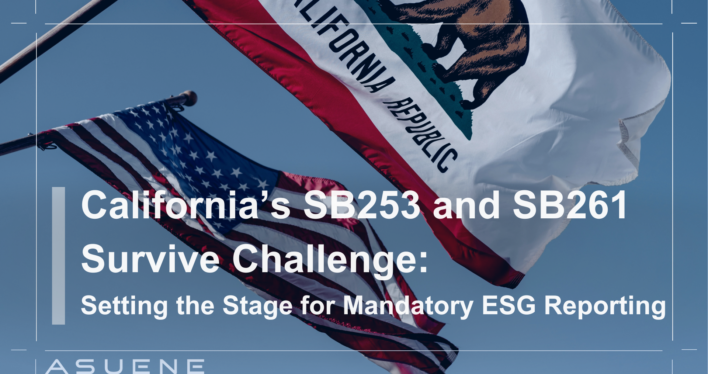- Article Summary
-
Introduction: California’s Climate Disclosure Laws at a Crossroads
California has long been a global leader in environmental regulation, and its latest climate reporting laws confirm that reputation. Senate Bills 253 and 261, which mandate large companies to disclose greenhouse gas emissions and climate-related risks, survived another legal hurdle this month. A U.S. District Court rejected the U.S. Chamber of Commerce’s motion to block the laws on First Amendment grounds, clearing the way for their continued implementation. For companies, this is more than a legal skirmish; it represents a turning point in how businesses will be required to account for their role in climate change. Importantly, these rules put Scope 3 emissions, which often account for the majority of a company’s carbon footprint, squarely in the spotlight.
SB 253 and SB 261 Explained
To understand the significance of the ruling, it is worth breaking down the requirements of the two laws:
| Law | Threshold | Main Requirement | First Reporting Deadline |
|---|---|---|---|
| SB 253 | Companies with >$1 billion in revenue doing business in California | Annual reporting of Scope 1, Scope 2, and Scope 3 emissions, including value chain emissions | 2026 for Scope 1 and 2, 2027 for Scope 3 |
| SB 261 | Companies with >$500 million in revenue doing business in California | Reporting on climate-related financial risks and mitigation measures | January 1, 2026 |
Together, these laws capture thousands of companies operating in the state. The obligations extend far beyond direct emissions, demanding visibility across supply chains, procurement, business travel, waste, and water usage. The rules are among the most ambitious globally, aligning closely with trends in the EU’s Corporate Sustainability Reporting Directive (CSRD) and the SEC’s proposed climate disclosure framework.
Why Business Groups Are Fighting Back
The U.S. Chamber of Commerce and other business associations have led a coordinated effort to dismantle these regulations. Their main arguments include:
- First Amendment concerns: They claim the rules compel companies to engage in “subjective speech” about their climate risks and strategies.
- Practical challenges: Critics argue that accurately calculating Scope 3 emissions is nearly impossible, given the complexity of supply chains.
- Compliance burden: Businesses fear costly reporting requirements, especially for firms with international operations and less mature data systems.
| Common Scope 3 Reporting Challenges | Examples |
| Supplier engagement | Difficulty in obtaining reliable emissions data from smaller or international suppliers |
| Data quality | Reliance on estimations or industry averages rather than primary data |
| Coverage gaps | Missing categories such as business travel, commuting, or waste |
Despite these objections, regulators argue that climate risks are material to investors and markets, making disclosure a matter of public interest rather than optional communication.

The Court’s Reasoning and What Comes Next
U.S. District Judge Otis Wright II denied the Chamber’s request for a preliminary injunction, concluding that the plaintiffs had not shown a likelihood of success on their First Amendment claims. This decision follows two earlier rulings in favor of the state, signaling that the judiciary is leaning toward upholding California’s authority to regulate in this space.
While the trial is set for October 2026 and appeals remain possible, companies cannot afford to wait. Reporting obligations are already looming:
- 2026: Scope 1 and 2 emissions reporting begins, covering the previous fiscal year.
- 2027: Scope 3 emissions reporting begins.
- 2026: First climate-related financial risk reports due under SB 261.
| Regulation | California (SB 253 & 261) | SEC Proposal | EU CSRD |
| Scope 1 & 2 reporting | Mandatory (>$1B revenue) | Mandatory (public companies) | Mandatory |
| Scope 3 reporting | Mandatory (>$1B revenue, 2027) | Conditional (if material) | Mandatory |
| Climate risk disclosure | Mandatory (>$500M revenue) | Mandatory | Mandatory |
This comparison shows that California’s rules are on par with, or in some respects ahead of, global disclosure trends.
How the Ruling Impacts ESG-Focused Companies
For companies already pursuing ESG and sustainability strategies, California’s climate laws present both challenges and opportunities. Even proactive firms will need to ensure that their disclosures meet the specific requirements of SB 253 and SB 261. Unlike voluntary reports, these laws demand standardized, auditable, and comparable data, pushing ESG programs toward greater rigor.
This shift can strengthen ESG leaders. Firms that already collect Scope 3 data or conduct climate risk analysis will be better positioned to comply, potentially gaining an advantage as competitors scramble to catch up. Transparent reporting can also enhance credibility with investors, regulators, and consumers who increasingly demand evidence of action.
Most importantly, the ruling underscores a broader global trend: ESG is evolving from a voluntary framework into a regulatory mandate. With Europe’s CSRD and the SEC’s pending climate rules, California’s decision reinforces that sustainability disclosures are no longer optional. For ESG-oriented companies, this is a chance to align compliance with strategic value creation.
Conclusion: Preparing for the Era of Mandatory Climate Transparency
The survival of California’s climate reporting laws against court challenges signals that the momentum toward transparency is only accelerating. Companies should see this as more than a compliance exercise. Building systems for Scope 3 data collection, engaging suppliers, and conducting robust scenario analysis are not just legal necessities but strategic imperatives. By preparing early, firms can reduce compliance risks and position themselves as leaders in the transition to a low-carbon economy. Ultimately, California’s ruling does not just shape state-level policy; it sets a precedent for the future of climate disclosure in the United States and beyond.
Why Work with ASUENE Inc.?
Asuene is a key player in carbon accounting, offering a comprehensive platform that measures, reduces, and reports emissions. Asuene serves over 10,000 clients worldwide, providing an all-in-one solution that integrates GHG accounting, ESG supply chain management, a Carbon Credit exchange platform, and third-party verification.
ASUENE supports companies in achieving net-zero goals through advanced technology, consulting services, and an extensive network.


